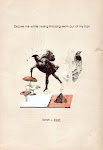The Cigarette by Francis Ponge (translated by Lee Fahnestock)
First let’s set the atmosphere, hazy yet dry, wispy, with the cigarette always placed right in the thick of it, once engaged in its continuous creation.
Then, the thing itself: a small torch, far more perfumed than illuminating, from which, in a number of small heaps set within a chosen rhythm, ashes work free and fall.
Finally, its sacrifice: the glowing tip, scaling off in silvery flakes, while a tight muff formed of most recent ash encircles it.
The Cigarette (translated by C.K. Williams)
Let’s first create the atmosphere, at once misty, dry, and dishevelled, in which the cigarette, since it itself continuously creates it, is always laid athwart.
Then its person: a little torch, much less luminous than fragrant, from which in a rhythm yet to be determined a measurable number of little lumps of ash detach themselves and fall away.
Finally, its passion: that fiery bud, flaking off into silver dandruff, held by a sleeve immediately formed by the most recent of them.
La Cigarette by Francis Ponge
Rendons d’abord l’atmosphere à la fois brumeuse et sèche, échevelée, où la cigarette est toujours posée de travers depuis que continument elle la crée.
Puis sa personne: une petite torche beaucoup moins lumineuse que parfumée, d’où se détachent et choient selon un rythme à dèterminer un nombre calculable de petites masses de cendres.
Sa passion enfin: ce bouton embrasé, desquamant en pellicules argentées, qu’un manchon immédiat formé des plus récentes entoure.
*
It seems to me the Williams’ translation has a couple inspired moments, eg “that fiery bud” for “bouton embrasé,” whereas the Fahnestock uses the simpler “glowing tip.” I also prefer Williams’ “sleeve” to “muff,” mostly because a sleeve for me evokes a long cylinder enclosing another long cylinder, something loosely housing something else. “Muff,” despite an unfortunate sexual connotation, is certainly on the mark, but a little cute at the same time.
I didn’t especially like Williams’ unappetizing rendering of “pellicules” as “dandruff,” but in fact that’s what “pellicules” is. Dandruff!
I think the main weakness of Williams’ translation is in the first segment, where he uses “create” twice. Fahnestock finds a way around that that’s more down-to-earth, but completely servicable and preferable to repetition. Secondly, Williams’ “laid athwart” reads awkwardly to me, while Fahnestock chooses the smoothly idiomatic “in the thick of it,” which goes so well with her later “heaps.” I like those “heaps,” and also prefer “perfumed” to “fragrant.”
To be honest, the more I look at this prose poem the more difficult it seems to translate well at all. So many phrasings offer themselves up to potential (and manifest) awkwardness. It would be lovely just to speak French. I think I’ll do that.
Subscribe to:
Post Comments (Atom)




2 comments:
Your final comments reminds me of the film, Adaptation.
Perhaps the commentary on a translation can be just as much fun.
I never saw that movie. If it's the one with Meryl Streep, it's on my to-see list.
Post a Comment